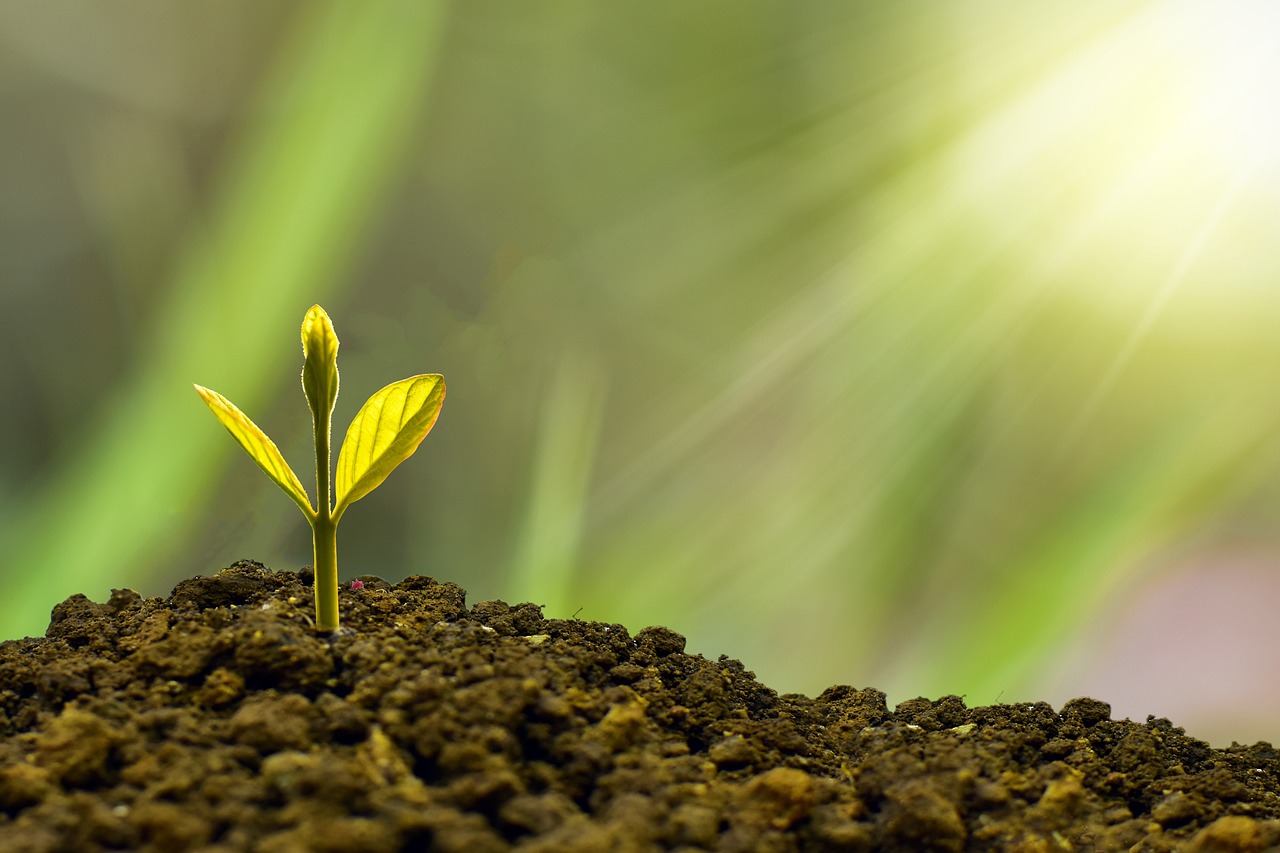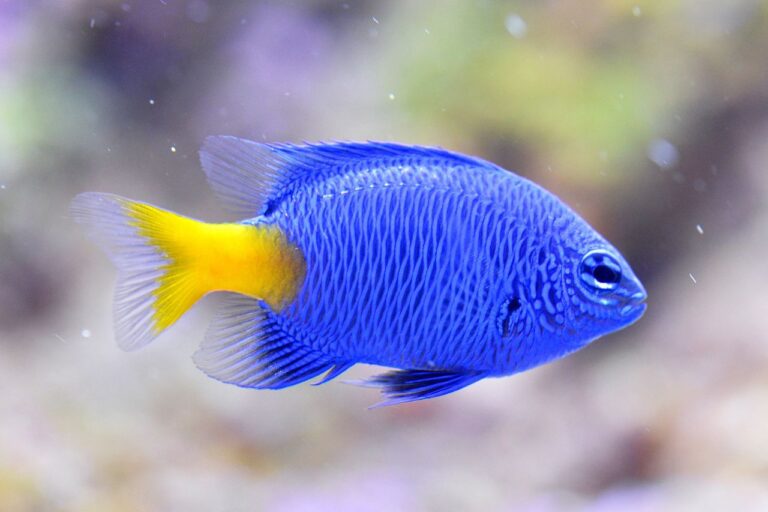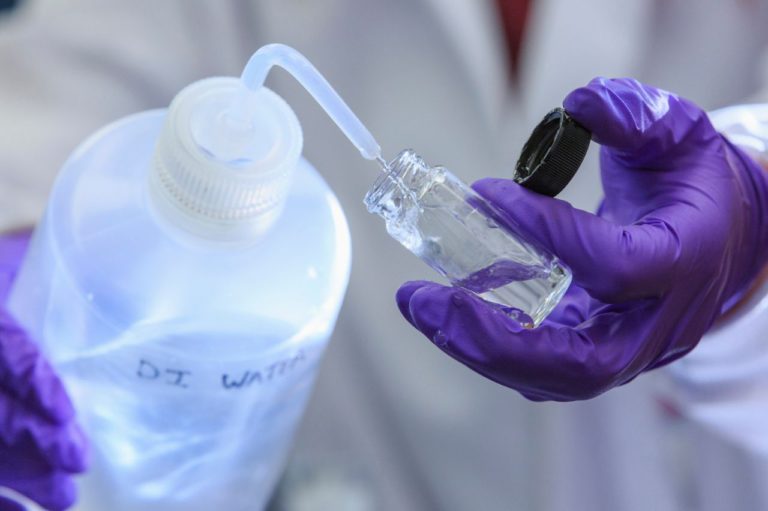Using Distilled Water On Plants
Using distilled water on plants can be a great way to give them the best start. It offers many benefits for your plants. By following the tips in this article, you can help your plants thrive.
Distilled water is a good choice because it lacks many contaminants found in tap water. This makes it perfect for gardeners who want to care for their plants the best way.
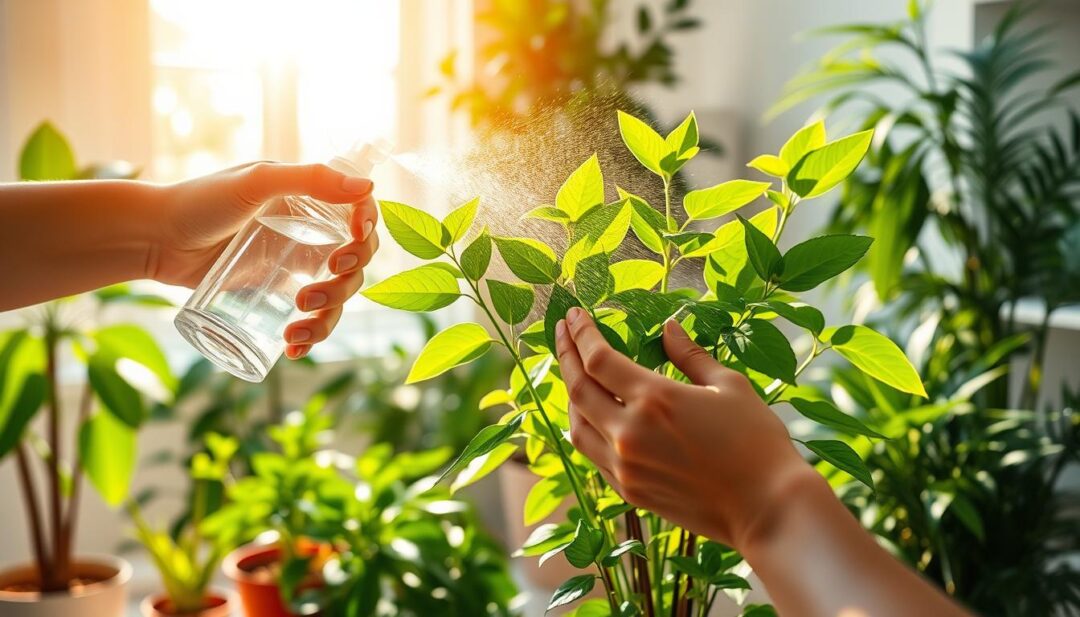
Using distilled water can improve your plants’ growth and nutrient absorption. It helps your plants grow strong and healthy. It also reduces the risk of disease and pests.
Whether you’re a seasoned gardener or just starting, using distilled water is a great step. It takes your plant care to the next level.
Key Takeaways
- Using distilled water on plants can improve growth rates and overall health
- Distilled water is free from many contaminants found in tap water
- The benefits of using distilled water for plants include better nutrient absorption
- Distilled water can help reduce the risk of disease and pests in plants
- Using distilled water on plants is a great way to take your plant care to the next level
- Distilled water is a great option for gardeners who want to give their plants the best possible care
What Makes Distilled Water Different from Tap Water
Many gardeners ask about distilled water for plant care. The difference is in the distillation process. It removes harmful impurities and minerals. Using distilled water for plant care ensures your plants get pure water.
Understanding how to use distilled water for plants is key. Distilled water is made by boiling and then collecting the steam. This leaves out impurities and minerals found in tap water.
Key Differences Between Distilled and Tap Water
- Mineral content: Tap water has minerals like calcium and magnesium. These are good for humans but bad for plants.
- pH level: Distilled water has a neutral pH. Tap water’s pH can vary.
- Impurities: Distilled water lacks chlorine, fluoride, and heavy metals found in tap water.
Choosing distilled water for plant care is a smart move. It gives your plants a clean start. Distilled water’s pure and mineral-free nature is perfect for gardeners who want their plants to flourish.
The Science Behind Using Distilled Water on Plants
Using distilled water can greatly improve plant growth and health. It offers many benefits, backed by research. Understanding the science behind it helps appreciate its advantages.
Distilled water helps plants absorb nutrients better and reduces contamination risks. It lacks harmful impurities and minerals. This allows plants to grow stronger and healthier.
- Reduced risk of over-fertilization
- Improved soil structure
- Increased plant resistance to disease
Adding distilled water to your plant care routine can be very beneficial. It’s great for both new and experienced gardeners. Using it can lead to healthier and more vibrant plants.
Benefits of Using Distilled Water for Plants
Using distilled water on plants can greatly improve their health and growth. It helps remove harmful minerals and prevents salt buildup in the soil. This is crucial for plants that are sensitive to certain minerals or need specific watering.
Some key benefits of using distilled water for plants include:
- Improved nutrient absorption, allowing plants to thrive and grow stronger
- Reduced risk of common problems such as root rot and leaf burn
- Healthier plant growth, with increased resistance to disease and pests
Using distilled water helps create a better growing environment for your plants. This leads to faster growth and a more vibrant, healthy look. Whether you’re a seasoned gardener or new to it, using distilled water can greatly benefit your plants’ health and success.
Using distilled water also reduces the risk of over-fertilization and promotes better root development. By giving your plants the right amount of water and nutrients, they can grow and thrive in a healthy, sustainable way.
Which Plants Thrive Best with Distilled Water
Some plants do better with distilled water than others. This water helps plants grow faster and absorb nutrients better. Plants like orchids and bonsai trees are especially good with distilled water because they don’t like minerals and salts in tap water.
Using distilled water has many benefits for plants. It stops salt from building up in the soil, which is bad for plants. Here are some plants that do well with distilled water:
- Seedlings and young plants, which are more susceptible to damage from tap water impurities
- Succulents and cacti, which are sensitive to overwatering and can benefit from the pure water
- Plants with delicate roots, such as ferns and peace lilies, which can be damaged by tap water minerals
Distilled water is great for plants that easily get root rot or other problems from tap water. Switching to distilled water gives your plants the cleanest water. This helps them grow well.
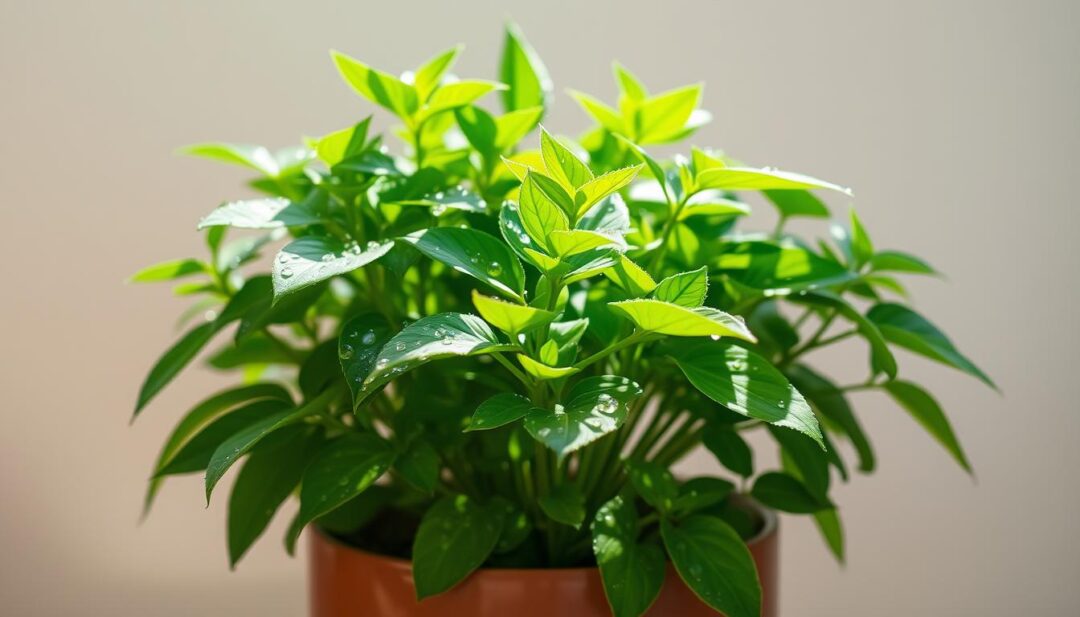
How to Properly Water Plants with Distilled Water
Using distilled water for plants is beneficial, but it’s crucial to do it right. Start by checking the soil moisture with your finger. If it’s dry, it’s time to water.
Here are some tips to keep in mind:
- Water your plants in the morning, so the plants have the entire day to absorb the water.
- Use room temperature distilled water to avoid shocking the roots.
- Water thoroughly, but make sure not to overwater, as this can lead to root rot and other problems.
By following these simple tips, you can ensure your plants are getting the right amount of distilled water. You’ll become an expert in no time. Remember, finding the right balance is key.
| Plant Type | Watering Frequency |
|---|---|
| Indoor plants | Every 2-3 days |
| Outdoor plants | Every 1-2 days |
Potential Drawbacks and Considerations
Using distilled water for plant care has its downsides. While it offers many benefits of using distilled water for plants, like removing harmful minerals, it’s not perfect. It might not be the best choice for all plants.
Some plants need minerals or nutrients that get lost in the distillation process. If you only use distilled water, your plants might not get what they need. But, you can fix this by adding a balanced fertilizer or changing how often you water.
Here are some key things to think about:
- Watch how your plants react to distilled water and adjust your care as needed.
- Think about adding a balanced fertilizer to give your plants the nutrients they might miss in distilled water.
- Try mixing distilled water with other types of water, like rainwater or tap water, to create a better watering schedule.
Knowing the potential downsides and how to overcome them lets you use the benefits of using distilled water for plants safely. With some planning and care, distilled water can be a great addition to your plant care routine.
Cost-Effective Ways to Source Distilled Water
Looking into the benefits of using distilled water on plants? It’s key to find affordable ways to get it. While distilled water is good for plants, buying it can be pricey. Luckily, there are many ways to make it more affordable.
Using distilled water helps plants take in nutrients better, leading to healthy growth. Gardeners can see their plants grow faster and absorb nutrients better. This is a big plus of using distilled water.
- Home distillation methods, which can be a cost-effective way to produce distilled water
- Commercial options, such as purchasing distilled water from a reputable supplier
- Alternative water purification methods, like reverse osmosis or deionization
Gardeners can find affordable ways to get distilled water. Whether making it at home or buying it, it’s a smart choice for plant health. It’s an investment in the well-being of plants.
Combining Distilled Water with Other Plant Care Practices
To get the most out of distilled water for plants, mix it with other good plant care habits. This way, you can make a complete care plan that helps your plants do well. Using distilled water with fertilizers is a good idea. It lets plants get the nutrients they need without the risk of mineral buildup.
Another smart move is to use distilled water when you prune your plants. Pruning keeps plants looking good, helps them grow healthy, and boosts fruiting or flowering. Distilled water ensures your plants get the cleanest water, without any harmful stuff that might slow them down.
Here are some more tips for mixing distilled water with other plant care habits:
- Use distilled water when repotting plants to prevent mineral buildup in the soil.
- Combine distilled water with organic fertilizers for a balanced nutrient intake.
- Monitor your plants’ response to distilled water and adjust your care routine accordingly.

By following these tips and knowing the perks of using distilled water for plants, you can craft a complete plant care plan. This plan will help your plants grow strong and make the most of distilled water.
Conclusion: Making the Switch to Distilled Water for Healthier Plants
We’ve looked at how using distilled water helps your plants. It removes harmful minerals and prevents salt buildup. This makes nutrients easier for plants to absorb. By following our tips, your plants will grow stronger and look better.
Switching to distilled water might take some work at first. But the benefits for your plants are huge. You’ll also feel good knowing you’re giving them the best water. So, try it out and see how it changes your garden or indoor plants.
Using distilled water is part of taking good care of your plants. Add it to practices like fertilizing, pruning, and controlling pests. With these steps, your plants will flourish. Dedicate yourself to the right care, and your plants will thrive for many years.
Frequently Asked Questions
What is the difference between distilled water and tap water for plants?
Distilled water is purified to remove impurities and minerals. Tap water, on the other hand, may have harmful substances. Using distilled water can provide plants with a cleaner water source.
How does distilled water benefit plant growth and health?
Distilled water helps plants by removing harmful minerals and preventing salt buildup. It also improves nutrient absorption and supports better growth. This creates a healthy environment for your plants to thrive.
Which types of plants thrive best with distilled water?
Many plants benefit from distilled water, especially sensitive ones and cacti. Hydroponic plants and those prone to mineral buildup also do well. Always check your plant’s specific needs.
How should I water my plants with distilled water?
Water your plants with distilled water at the right frequency and temperature. Choose the best time of day. This ensures your plants get the most from distilled water.
Are there any potential drawbacks or considerations when using distilled water for plants?
While distilled water is great, it can lead to nutrient deficiencies if not balanced. Gradually introducing it to your plants can prevent shock. Knowing these points helps use distilled water wisely.
How can I source distilled water for my plants in a cost-effective way?
You can get distilled water affordably by buying a home distiller or from local stores. Online options and reverse osmosis are also viable. Choose based on your needs and budget.
How can I combine using distilled water with other plant care practices?
Use distilled water with fertilizing, pruning, and pest control for a holistic approach. Adding distilled water to your routine can enhance your plant care efforts.

